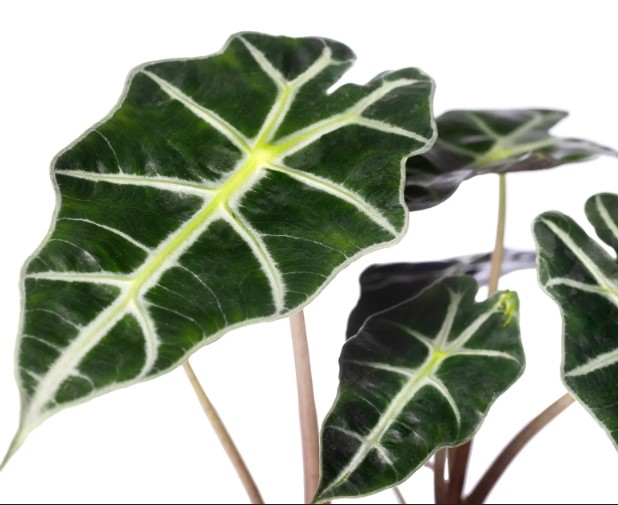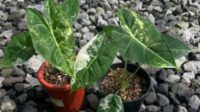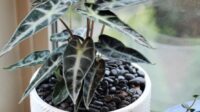
The Alocasia Tigrina Variegated is a true gem for rare plant collectors. Known for its striking, tiger-striped stems and beautifully variegated leaves, this plant is a statement piece that exudes elegance and rarity. Native to tropical rainforests, this variety demands attention with its elongated, arrow-shaped foliage marked by creamy white and green marbling. As one of the most sought-after Alocasias, understanding its unique traits and specific care requirements is essential for enthusiasts eager to add it to their collection. In this guide, we’ll explore what makes this plant extraordinary and how to care for it effectively.
1. The Allure of Alocasia Tigrina Variegated
This plant’s rare variegation and bold stem patterns make it a standout addition to any collection.
– Key Features:
– Tiger-like patterns on its stems.
– Stunning leaf variegation with cream and green hues.
– Graceful, elongated foliage resembling spears.
2. Native Habitat of Alocasia Tigrina Variegated
Understanding its origins helps replicate its natural environment.
– Region: Tropical rainforests of Southeast Asia.
– Climate: High humidity, warm temperatures, and dappled light.
3. Light Requirements
Proper lighting is critical for maintaining its variegation.
– Bright, Indirect Light: Essential to prevent leaf scorching.
– Avoid Direct Sunlight: Harsh rays can cause the delicate variegation to fade.
– Supplemental Light: Grow lights can be used in low-light conditions.
4. Ideal Temperature Range
Alocasia Tigrina Variegated thrives in warm temperatures between 65°F and 85°F (18°C–29°C).
– Consistency: Avoid sudden temperature fluctuations.
– Cold Intolerance: Never expose it to temperatures below 60°F (15°C).
5. Humidity Preferences
High humidity is a must for this tropical beauty.
– Optimal Level: Maintain humidity between 60% and 80%.
– Boosting Humidity: Use a humidifier, mist regularly, or place the plant near a pebble tray.
6. Watering Routine
Getting the balance right is essential to avoid overwatering or underwatering.
– Frequency: Water when the top 2–3 inches of soil feel dry.
– Avoid Stagnant Water: Ensure excess water drains to prevent root rot.
– Water Quality: Use filtered or distilled water to avoid mineral buildup.
7. Soil Mix for Healthy Growth
A well-draining, aerated soil mix is crucial for this Alocasia.
– Recommended Mix: Combine potting soil, perlite, and orchid bark.
– pH Range: Slightly acidic to neutral (6.0–7.0).
8. Fertilization Needs
Fertilize to support healthy growth and maintain variegation.
– Type: Use a balanced liquid fertilizer with a ratio like 10-10-10.
– Frequency: Feed every 4–6 weeks during the growing season (spring and summer).
– Dilution: Always dilute fertilizer to avoid overfeeding.
9. Repotting Alocasia Tigrina Variegated
Repotting helps the plant grow without constraints.
– When to Repot: Every 1–2 years or when roots outgrow the pot.
– Choosing a Pot: Opt for a container with good drainage.
10. Pest Management
Like other Alocasias, this variety is susceptible to pests like spider mites and mealybugs.
– Prevention: Inspect leaves regularly and keep them clean.
– Treatment: Use neem oil or insecticidal soap if pests are detected.
11. Propagation Techniques
Propagating Alocasia Tigrina Variegated can be done through division.
– Best Time: During repotting in spring or summer.
– Method: Separate offsets with established roots and pot them in fresh soil.
12. Common Problems and Solutions
– Brown Leaf Edges: Indicates low humidity. Increase moisture levels around the plant.
– Yellowing Leaves: May result from overwatering. Check soil drainage and adjust watering practices.
– Loss of Variegation: Caused by insufficient light. Ensure bright, indirect lighting.
13. Decorating with Alocasia Tigrina Variegated
This plant’s dramatic appearance makes it a focal point.
– Ideal Placement: Display in living rooms or conservatories with ample indirect light.
– Complementary Decor: Pair with minimalist pots to emphasize its exotic look.
14. Rarity and Market Value
As a highly coveted plant, Alocasia Tigrina Variegated often commands a premium price.
– Factors Affecting Cost:
– Limited availability due to slow propagation.
– High demand among collectors.
– Investment Worthiness: Its rarity and beauty make it a valuable addition to any collection.
15. Long-Term Care and Enjoyment
Caring for Alocasia Tigrina Variegated is a rewarding experience. With proper attention to its needs, this plant can thrive for years, becoming a cherished part of your collection.
– Benefits of Long-Term Care:
– Adds an exotic touch to your indoor garden.
– Offers a unique conversation starter for guests.
Conclusion
The Alocasia Tigrina Variegated is more than just a plant it’s a living work of art. With its tiger-striped stems and mesmerizing variegation, it’s a true treasure for rare plant enthusiasts. While it demands specific care, the effort is well worth the reward. By following the tips outlined in this guide, you can enjoy the beauty of this exotic plant and ensure its healthy growth in your collection.
Caring for Alocasia Wentii is both rewarding and straightforward with the right approach. By providing optimal lighting, humidity, and watering, you can ensure this tropical beauty thrives indoors. Whether you’re an experienced gardener or just starting, the Alocasia Wentii makes a stunning addition to any plant collection, offering elegance and charm year-round.
Planting Alocasia doesn’t have to be intimidating. With the right tools, knowledge, and care, you can enjoy the beauty and charm of this tropical wonder in your home or garden. By following this step-by-step guide, even beginners can confidently plant and nurture Alocasia varieties, ensuring they thrive and grow into stunning focal points. Happy planting!






